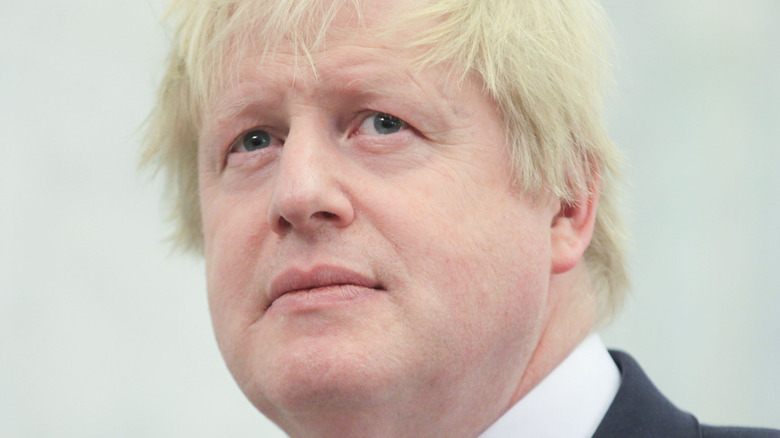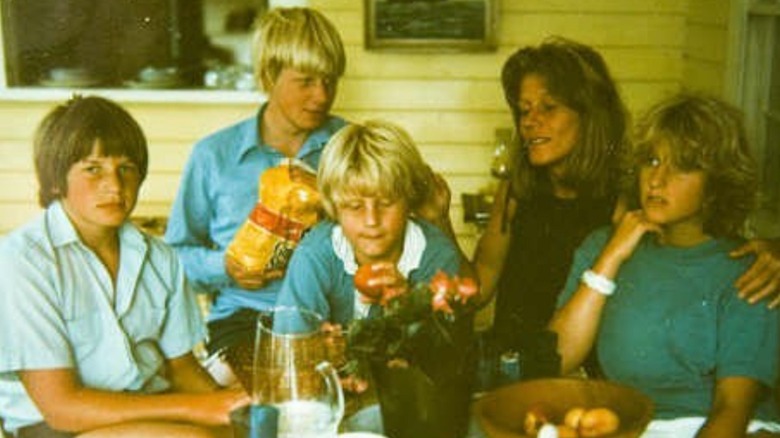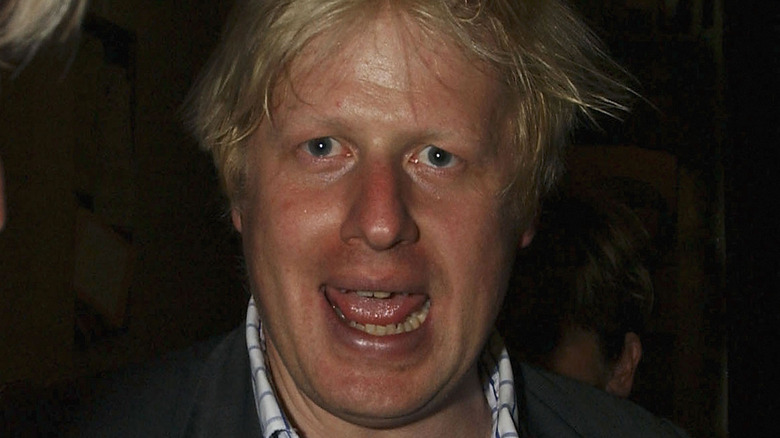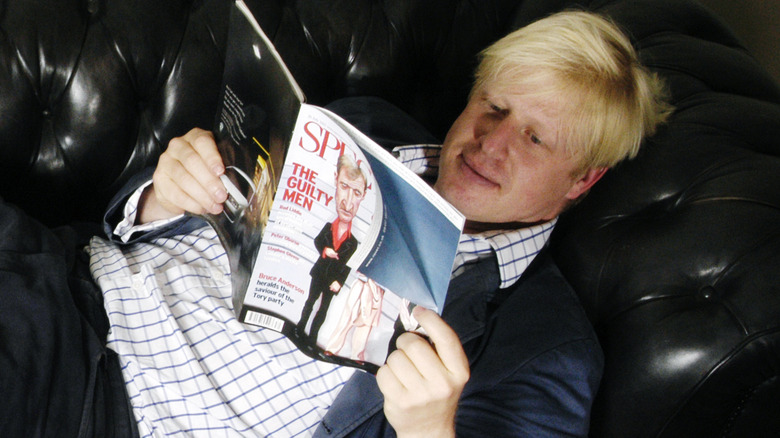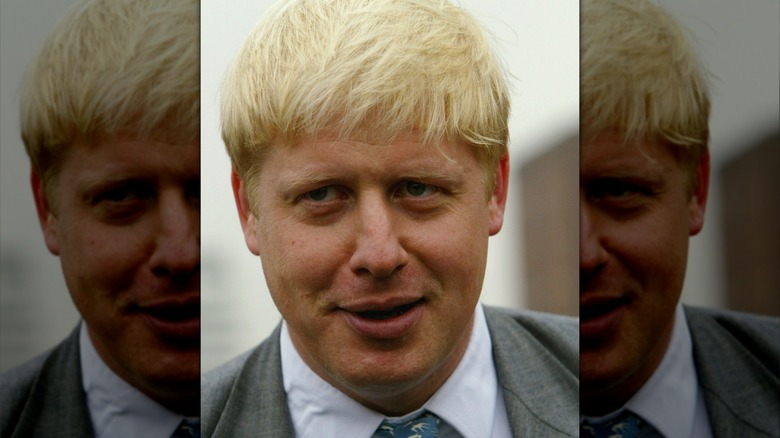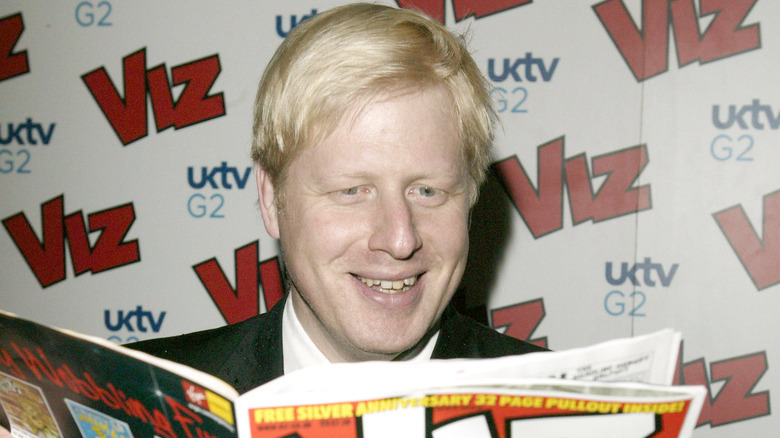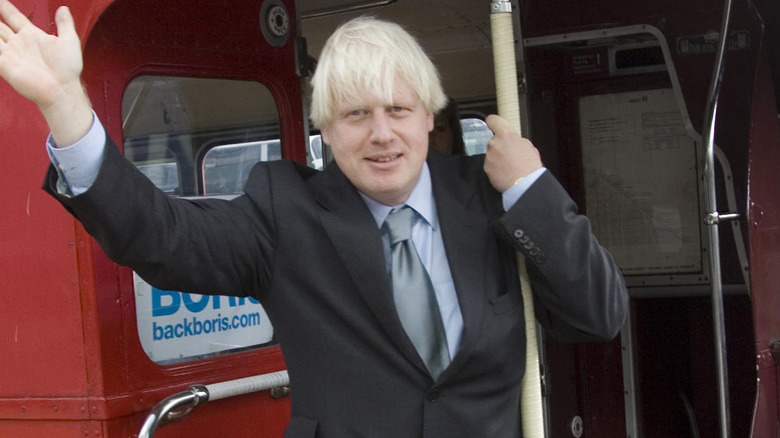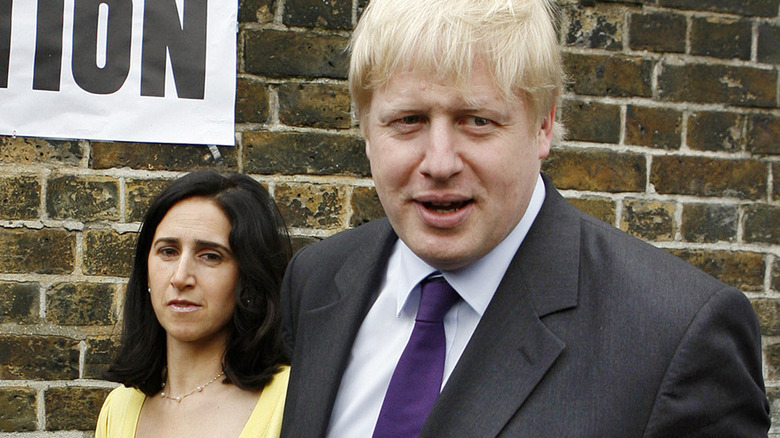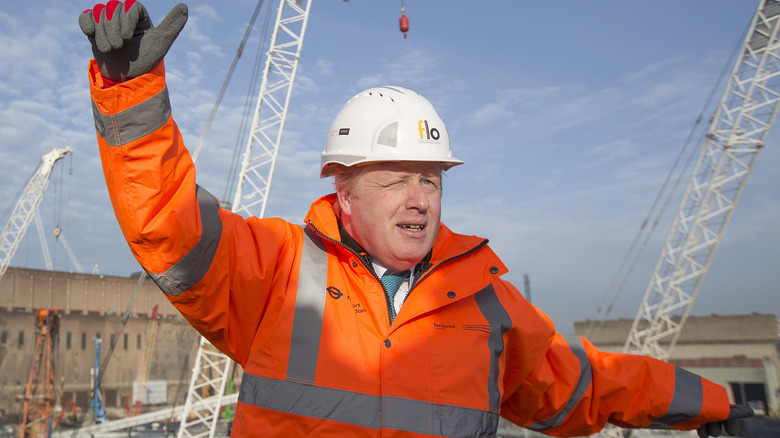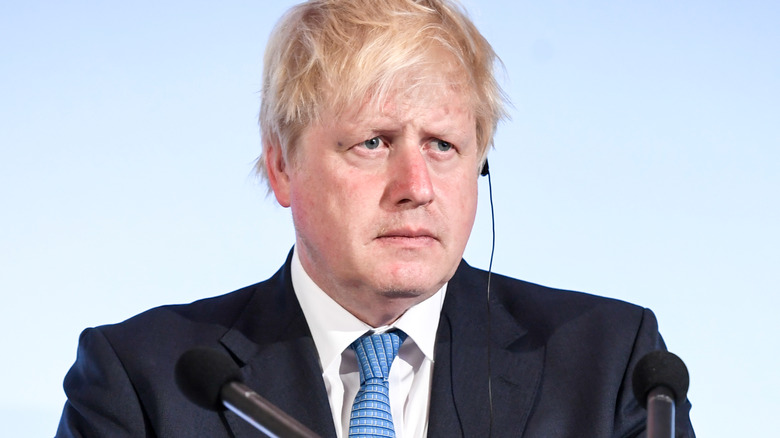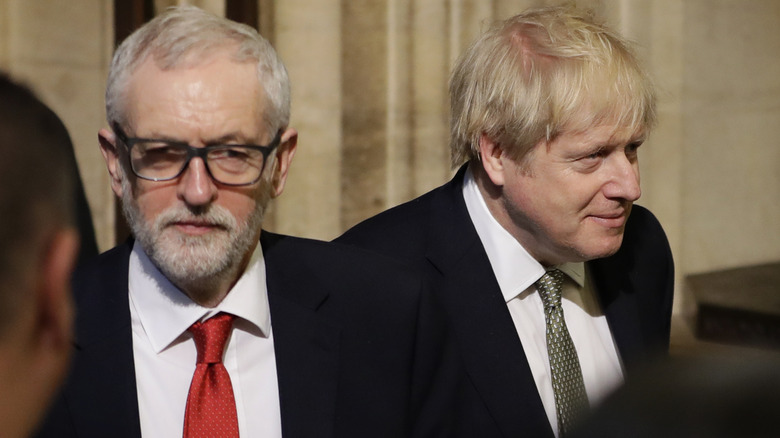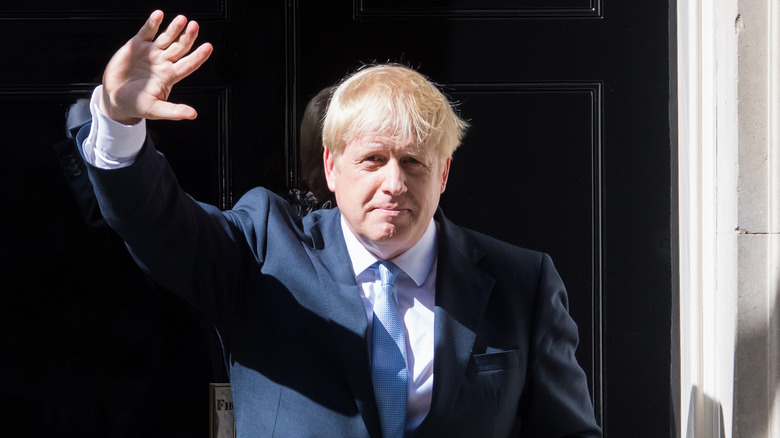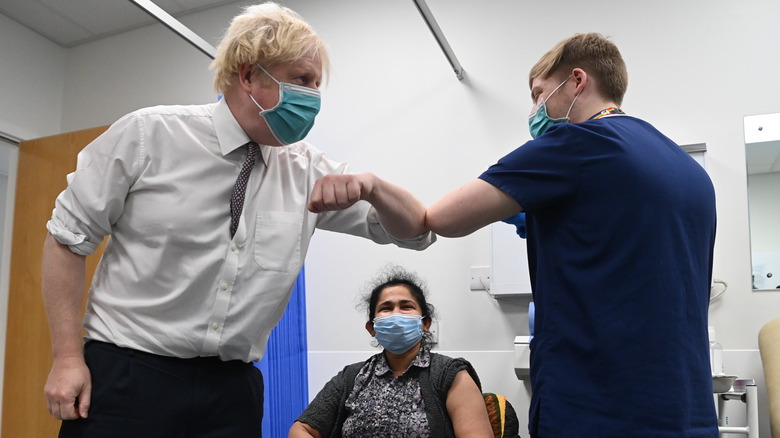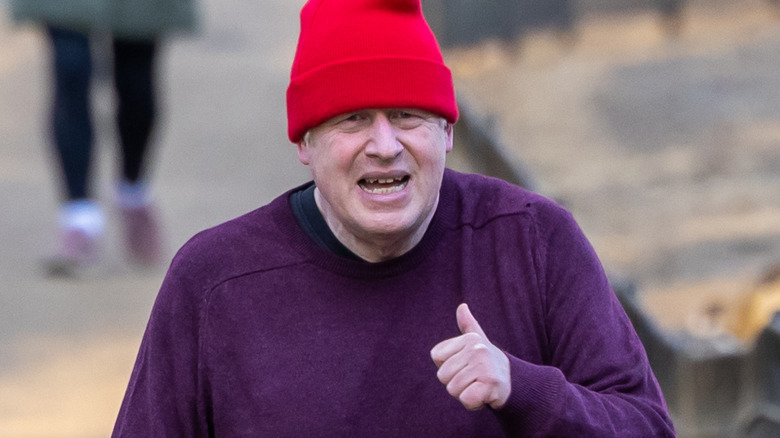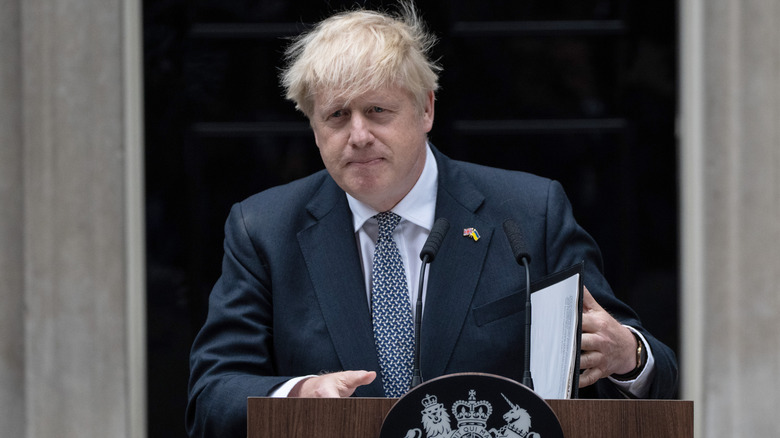The Rise And Fall Of Boris Johnson's Political Career
The following article includes brief mentions of racist language and sexual harassment.
"I have as much chance of becoming Prime Minister as of being decapitated by a frisbee or of finding Elvis," Boris Johnson once told the Daily Mail (via "The Big Book of Boris"). Well, Boris better tell us where Elvis is hiding, because according to the man himself, it seems like miracles do happen. Sporting his signature messy mane of flaxen locks, the newly ousted PM has built an entire career out of honing an eccentric "Jeeves and Wooster"-esque persona. Despite his aptitude at charming the public, few would have believed that the mop-top maverick would lead Blighty one day. But if those closest to him are to be believed, Johnson always wanted to be No. 1, which is why he ended up in Number 10.
With his colorful vocabulary (he once referred to his colleagues as "great supine protoplasmic invertebrate jellies"), Johnson has long relied on making a fool of himself as a distraction. During appearances on the satirical panel show "Have I Got News for You," he popularized his persona by allowing his co-panelists to mock him. But Johnson's undoing, it seems, lay in his penchant for telling perhaps one too many fibs. While he certainly isn't the first politician to dupe the public, his July 2022 resignation played out on the world stage. One thing is certain, though: we didn't expect him to leave so soon (indeed, he'd spoken of his excitement at a third term that June).
Only time will tell if BoJo will get his mojo back: This is the rise and fall of Boris Johnson's political career.
Boris Johnson was born into a life of privilege
Boris Johnson, or Alexander Boris de Pfeffel Johnson as his birth certificate states, was born into a wealthy, but discordant, upper middle-class family. From an early age, Boris expressed political ambitions. Per The Guardian, the youngster was a competitive young boy and declared that his goal was to one day be "world king." He attended Eton, one of the most elite private schools in Britain, where he began to develop the public character of an odd, quintessential Brit to deal with bullying (he was the target of racist taunts due to being part Turkish).
The future PM's parents didn't necessarily share his political beliefs, however. His mom, Charlotte Johnson Wahl, leaned toward socialism, with her daughter, Rachel Johnson, referring to her as "the only red in the village when we lived on Exmoor," per the Evening Standard. Boris' father, Stanley Johnson, meanwhile, is an environmentalist and staunch supporter of the European Union.
While at school, Boris reportedly expressed an arrogant ambitious streak. When he was 17, his classics teacher, Martin Hammond, described him in a letter as displaying "effortless superiority," per the Daily Mail. "Boris sometimes seems affronted when criticized for what amounts to a gross failure of responsibility (and surprised at the same time that he was not appointed Captain of the school for the next half)," Hammond continued. "I think he honestly believes that it is churlish of us not to regard him as an exception, one who should be free of the network of obligation that binds everyone else."
At Oxford, he was a Bullingdon Club member
After leaving school, Boris Johnson attended the prestigious Oxford University, where he was a member of the notorious Bullingdon Club. According to his former classmates and associates, he admittedly engaged in behavior that is, unfortunately, typical of the group, such as demeaning women and the poor and hosting lavish, debauched parties. "Boris was one of the big beasts of the club. He was up for anything," a woman who attended one such party told The Guardian. "They treated certain types of people with absolute disdain, and referred to them as 'plebs' or 'grockles,' and the police were always called 'plod.' Their attitude was that women were there for their entertainment."
Johnson has since expressed regret at the aforementioned shenanigans. "This is a truly shameful vignette of almost superhuman undergraduate arrogance, toffishness, and twittishness," he said in the "Boris Johnson: The Irresistible Rise" documentary (via Oxford Mail).
At Oxford, Johnson also began to launch his political career, per "Just Boris: A Tale of Blond Ambition." Accordingly, he began campaigning for the elite position of Secretary in the students' Union for Trinity, despite the fact that such a position was reserved for those with a higher ranking in the organization. Annabel Eyres, who attended Oxford at the same time as Johnson, wrote in The Telegraph that she and her fellow students always had a feeling he'd rise the political ranks to become prime minister. Eyres claimed that every step of Johnson's life had "all been part of [his] masterplan" to eventually run the country.
Early on, Boris Johnson showed an apparent aptitude for lying
In 1987, Boris Johnson began working as a journalist for conservative newspaper The Times, per "Blond Ambition." But his days at the paper became numbered in the following spring. The young journo's downfall came when he reportedly fabricated a quote when assigned with writing an article on the excavation of a palace that belonged to Edward II. The quote supposedly came from Johnson's godfather and Oxford University professor Dr. Colin Lucas, who contacted The Times to state that he had made no such claims. When editor Charles Wilson found out, Johnson was promptly fired.
Lying didn't hinder Johnson's chances of a flourishing career, however. As argued by The New York Times, he seemingly learned early on that it could be beneficial to him, which is perhaps why he continued to get away with it. Soon, Johnson snagged a job with The Telegraph. There, he sowed the seeds of his political agenda, building a reputation as an anti-European Union conservative, and publishing admitted falsehoods about the bureaucracy of the EU in an effort to promote his Euroscepticism (the ideology had previously been associated with the left — the Labour Party even campaigned for Brexit in the '80s).
Max Hastings, Johnson's boss when he was writing for The Telegraph, also expressed concern at what he saw as the future PM's tendency to lie. "Johnson would not recognize truth, whether about his private or political life, if confronted by it in an identity parade," Hastings wrote in a scathing reproach in The Guardian.
The future PM's role in plotting a journalist's assault
In 1990, Boris Johnson aided his childhood pal, Darius Guppy, when the latter discovered that journalist Stuart Collier, who wrote for the now-defunct News of the World, was investigating his crimes. Per "Blond Ambition," Guppy was involved in a scheme to defraud an insurance company out of £1.8 million ($2.1 million) by staging a robbery in New York. But Guppy, who was later convicted, became incensed when Collier started investigating the theft. As revenge, he reportedly plotted to have Collier attacked and thus turned to Johnson, who claimed he could secure the journalist's address and phone number.
Telephone calls between Guppy and Johnson were recorded by the former's one-time accomplice, Peter Ridsom. In one particularly incriminating exchange, Johnson can be heard asking Guppy, "How badly are you going to hurt this guy?" to which his friend replied that he'd have nothing more than "a couple of black eyes and ... a cracked rib." Guppy ultimately didn't go through with his pledge.
Addressing the controversy during a 1998 appearance on satirical panel show "Have I Got News for You," Johnson branded Guppy "a very great man" and declared that he was "not ashamed" of the phone calls. Speaking with The Guardian, Collier demanded an apology from Johnson, dismissing his claims that the plot was a harmless joke. "I didn't treat it as a joke," he said. "That's why I warned my wife to be careful about who she answered the door to. ... I was worried, certainly worried enough to put my wife on a warning."
Boris Johnson's first-time run as an MP
By 1999, Boris Johnson was appointed editor of prestigious conservative magazine The Spectator. At the time, he vowed to "continue to set the political agenda, and to debunk it," as noted by The New York Times. According to Johnson's successor, Fraser Nelson, the future PM apparently largely steered clear of the office during his time as editor, more concerned with fostering a jovial environment for the publication's writing team.
But Johnson's tenure at the magazine was not without controversy. In 2004, he published an article propagating the notion that Liverpool soccer fans were partly responsible for the Hillsborough disaster, in which 96 people were killed following a crush, though he apologized for any hurt caused, per BBC News. On another occasion, he was condemned for allowing right-wing columnist Taki Theodoracopulos to publish an article advocating racist fallacies (again, Johnson later apologized).
And Johnson continued with his apparent lying streak. Notably, he promised his editor, Conrad Black, that he would not pursue a political career, per The New York Times. But in 2001, he successfully ran as an MP for Henley. As reported by Yahoo! Life, senior Conservative MP Mike McInnes lamented that Johnson's run was "a disaster for the integrity of modern politics. If we were seeking an individual who demonstrates zero political insight in any major policy issues, then congratulations are in order." Accordingly, Johnson stepped down from editor of The Spectator in 2005, per The Guardian.
He became a conservative mayor of London
As MP for Henley, Boris Johnson was appointed shadow higher education minister by Conservative Party leader David Cameron. During this period, he cultivated a roguish persona to appeal to the public. For instance, in 2006, he joined a group of students for beer during a visit to Edinburgh University and also encouraged them to voice their opinions via his blog, per The Guardian. And it was this type of schtick that enabled him to secure his first great victory as a politician.
Johnson ran as the conservative candidate during the 2007 London mayoral election, relying on his cheeky chappy demeanor to encourage liberal Londoners to vote for him. Many criticized him for this carefully honed image, however, with detractors branding him "a type of Norman Tebbit in a clown's uniform." Ouch. But in a surprise move, the London electorate favored Johnson over his left-wing predecessor, Ken Livingstone, and he was hailed mayor of London in 2008, according to BBC News.
His efforts as mayor were predominantly focused on environmental issues, such as introducing the so-called Boris Bikes, aimed at discouraging Londoners from driving (Johnson himself is an avid cyclist). He was also praised for bringing the Olympics to London in 2012, though critics argued that Johnson's input was minimal. During his leadership, he also made numerous gaffes, including getting trapped on a zip wire, calling the London Assembly "great supine protoplasmic invertebrate jellies" (as previously mentioned), and tackling a child during a rugby game in Japan (he pulled a similar stunt during a charity soccer game).
Boris Johnson faced sordid rumors about his personal life
Throughout his career, Boris Johnson has faced intense scrutiny over his private life. Having wed lawyer Marina Wheeler, with whom he has four children, in 1993, Johnson engaged in numerous alleged extramarital affairs. In 2004, he was accused of impregnating his colleague, Petronella Wyatt, claims that he described as an "inverted pyramid of piffle," per The Times. However, Wyatt confirmed the affair and said that she had an abortion after falling pregnant with Johnson's child. As a result of the cheating allegations, he was fired from the conservative front bench.
In 2010, the Daily Mail reported that Johnson had fathered a daughter, Stephanie, with art adviser Helen Macintyre. In 2012, he allegedly embarked on an affair with American entrepreneur Jennifer Arcuri. Speaking with the Mirror, Arcuri claimed that Johnson told her she was the first American he'd ever had the hots for. "We were in an intimate relationship for four years," she said. "I loved him, and with good cause. But the man I thought I knew doesn't exist any more." When Arcuri expressed concern over their PDA, Johnson apparently told her, "This is my city, I don't care." Arcuri received £100,000 ($119k) in government money to fund her tech ventures.
In 2020, Johnson and Wheeler divorced, per The Times. Having been diagnosed with cancer in 2019, Wheeler was reportedly devastated when she discovered that Johnson was having an affair with Carrie Symonds, who is 24 years his junior, per the Mirror. Johnson wed Symonds the following year.
Inside Boris Johnson's Brexit pledge
By the mid 2010s, Boris Johnson's time as mayor was ending. In 2015, he, like many other politicians, clashed with Donald Trump over the Republican presidential nominee's claims that London had "no go" zones for non-Muslims. Per the Independent, Johnson said that Trump's comments were "complete and utter nonsense" and praised London's "proud history of tolerance and diversity." After serving two terms as mayor, Johnson, now the parliamentary representative for Uxbridge and South Ruislip, stepped down in 2016 and was succeeded by Sadiq Khan.
At this point, Johnson had set his sights on Brexit. Honoring the Euroscepticism of his days as a journalist, he campaigned for Vote Leave during the EU referendum. Despite the fervor with which he advocated for Brexit, it was revealed that he had written an unpublished pro-Remain article for The Telegraph, in addition to a pro-Leave one that was published days later, according to Sky News.
Johnson famously posed in front of a bus that promised an extra £350 million funding for the NHS, a pledge that was removed from the Vote Leave website once the country voted to leave the EU in July 2016. Per The Guardian, Brexiteers soon abandoned the £350 million pledge. However, Johnson later told fellow MPs in Parliament (via The National), "This was a figure that related to the gross sum that the U.K. gave to the EU budget. ... Actually it turned out to be [if] anything a slight under-estimate!" Following the referendum, Prime Minister David Cameron, who supported Remain, resigned, per BBC News.
Boris Johnson's disastrous time as foreign secretary
After David Cameron resigned, there was a leadership contest for the Conservative Party. Although Johnson was a favorite to succeed Cameron, his campaign manager, Michael Gove, said that he was "not capable of leading the country," effectively ending his leadership bid, per The Guardian. Theresa May won the leadership contest and she appointed Johnson Foreign Secretary.
His stint as foreign secretary was highly controversial, particularly when he hindered the chances of a British woman being freed from an Iranian jail. Nazanin Zaghari-Ratcliffe was imprisoned in Tehran in 2016 under spurious claims that she was spying for the U.K., The Guardian reported. When Johnson had talks with Iranian leaders, he made a gaffe in which he said that Zaghari-Ratcliffe was teaching journalists in Iran, claims that were entirely false and led to her remaining in jail for another five years. Zaghari-Ratcliffe, who was released in 2022, blamed Johnson for the delay in her freedom, telling him, "I just want you to know the mistake, the comments in 2017, had a lasting impact," per BBC News.
In June 2018, Johnson was at the center of further controversy when BuzzFeed News obtained audio recordings of him questioning May's leadership. Contrary to his past admonishment of Donald Trump, Johnson was heard commending the then-POTUS, suggesting that he would do a better job of leading the U.K. out of the EU than May. He resigned from May's cabinet the following month, per The Times.
He went head-to-head with Jeremy Corbyn
In May 2019, Theresa May resigned as prime minister and Boris Johnson made a bid for the Tory leadership, per BBC News. With a staunchly pro-Leave agenda, he won the Conservative Party leadership contest. But that September, he lost the backing of many members of his party, including that of his own brother, Jo Johnson, who quit as a Tory MP. Accordingly, Boris lost his working majority, and a general election was called for December, according to CNN.
The general election saw Boris go head-to-head with left-wing Labour Party leader Jeremy Corbyn. Boris' campaign saw him frequently attacking the opposition. Speaking with The Sun (via ITV), Johnson claimed of his opponent, "Every time he has the chance, he sides with our enemies." Meanwhile, Corbyn branded Johnson as "Britain's Trump, the fake populist and phoney outsider," as reported by Sky News. Moreover, Johnson accused Corbyn of failing to tackle antisemitism within the Labour Party, while Corbyn hinted at the would-be PM's use of racist language in the past, per the Independent.
The atmosphere fostered much toxicity. Indeed, a report by the Electoral Commission found that the Tories used misleading campaign techniques, according to BBC News. For instance, the Conservative campaign promoted false or partly incorrect information. Nevertheless, Johnson won by a landslide, the largest Conservative majority following Margaret Thatcher's win in 1987. As noted by The Guardian, Johnson's Brexit stance enabled him to win over traditional Labour voters in the North.
Boris Johnson was hailed prime minister
He may not have been king of the world, as he initially aspired, but Boris Johnson finally fulfilled his childhood ambition of running the country when he won the December 2019 election. Per The American, he became the first British prime minister to have been born in the United States. "Getting Brexit done," as Johnson would put it, was at the top of his priorities. And it became official on January 31, 2020. In a tragic case of famous last words, however, the PM had declared on Twitter that "this is going to be a fantastic year for Britain," followed by a snap of Johnson grinning with two thumbs up.
Some accused Johnson of suffering from an over-inflated ego following his landslide victory. Indeed, Johnson proclaimed that thanks to his leadership, the U.K. was entering a "new age," a sentiment that The Conversation argued eerily echoed the tactics of Roman emperors. For instance, Johnson demanded sovereignty from the EU, per Sky News. His leadership saw him once again backtrack on his apparent pro-Donald Trump stance when he, Justin Trudeau, and Emmanuel Macron were caught apparently gossiping about The Donald at a NATO event in December 2019, per CNBC. Upset by the footage, Trump branded Trudeau as "two-faced."
In February 2020, Johnson was accused of not taking his position seriously when he mysteriously disappeared from the public eye for 12 days, per Politico. Consequently, then-opposition-leader Jeremy Corbyn accused him of "schmoozing Tory Party donors ... instead of getting out there and supporting the people."
The PM became ill with COVID-19
Mere months into Boris Johnson's leadership, the world was rocked by the COVID-19 pandemic. He may have claimed the U.K. was entering a new age with his leadership, but Johnson soon ate — and grew humbled by — his own words. Accordingly, in March 2020, Johnson implemented a nationwide lockdown that banned all social mixing and forbade people from leaving their homes (unless for essential work or brief exercise), per CNN.
Despite imposing these rules, Johnson was heavily criticized for not acting sooner. "We closed down too late — that's clear from the maths," a European Public Health professor named Martin McKee said (via Bloomberg). "English exceptionalism has been really damaging." Moreover, the government hoped to keep coronavirus deaths lower than 20,000, but by the end of 2020, deaths had exceeded 69,000, according to the Office for National Statistics. What's more, Johnson actually boasted of shaking hands with COVID-19 patients in the hospital that March, which proved to be a bizarre and dangerous stunt.
Johnson led the country through the pandemic but ended up contracting the disease himself that April. After becoming seriously ill with COVID-19, he was admitted to the ICU, per NBC News. He told The Sun that doctors prepared to announce his death in the event of "a 'death of Stalin'-type scenario." After recovering, Johnson began the vaccine rollout in December 2020. As noted by GOV.UK, the U.K. became the first country in the world to administer a COVID-19 vaccine (outside of clinical trials). The rollout was a success, and things seemed to be looking up for Johnson.
Partygate and the beginning of the end
There are many ways for politicians to ruin their careers — but a surefire way to commit political self-assassination is by doing exactly what one warned the public not to. Despite urging the country to stay at home during the pandemic and allowing police to arrest and fine individuals for any breach in lockdown rules, Boris Johnson was found to have broken lockdown on numerous occasions. And thus began the debacle dubbed "partygate." As reported by ITV, he was snapped sipping alcohol at a party, while in close proximity with his colleagues, at the height of the pandemic (Johnson claimed he didn't know he was breaking the rules).
The revelations were particularly damning considering that many people lost their loved ones during the pandemic and were banned from saying goodbye. Moreover, some have highlighted the apparent hypocrisy of partygate in that the very measures implemented to prevent social distancing led to the murder of Sarah Everard, a young woman who was stopped by a Met police officer, supposedly under the guise that she broke lockdown. The officer was later convicted of kidnapping and murdering her.
As argued by Evening Standard, "Sarah genuinely believed herself to be under arrest for walking home after seeing a friend. Back then, if those of us outside No. 10 bent the rules, we were all too accepting of the consequences." What's more, those who attended her vigil were targeted by the police. Johnson was subsequently fined £50 ($59), but defied demands that he ought to resign.
Boris Johnson's day of reckoning
Slowly but surely, the veil was lifted on Boris Johnson, with his speeches appearing to grow increasingly incoherent toward the end of his reign as PM. In one such speech on British industry, he mimicked the sound of a car engine, forgot his lines while repeatedly uttering, "Forgive me," and then began waxing lyrical about children's amusement park Peppa Pig World being a beacon of British ingenuity, per Sky News.
By the summer of 2022, Johnson's days were numbered. Although he survived a vote of no confidence, he came under further scrutiny when it was revealed that he knew the chief whip, Chris Pincher, was sexually assaulting men, having apparently branded him "Pincher by name, pincher by nature." Thus began a mass Tory rebellion. More MPs resigned within a 24-hour period than at any time in parliamentary history, accoridng to Sky News. Despite insisting that he would remain PM, Johnson had no choice but to announce his resignation on July 7, 2022.
Upon leaving 10 Downing Street, some have suggested that Johnson, who previously found fame as a guest host on the panel show "Have I Got News for You," could embark on a career as a reality TV star, following in the footsteps of his father (the elder Johnson appeared on "I'm a Celebrity" in 2017). "We would like to see Boris eating kangaroo testicles, if we're honest," PR exec Joseph Hagan told Metro. He may or may not be going down under, but Boris Johnson's certainly down and out of the political game.
If you or anyone you know has been a victim of sexual assault, help is available. Visit the Rape, Abuse & Incest National Network website or contact RAINN's National Helpline at 1-800-656-HOPE (4673).

